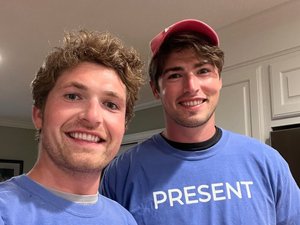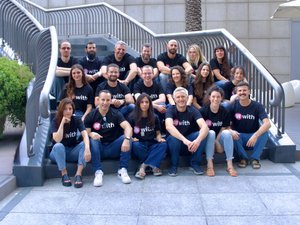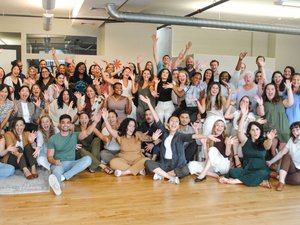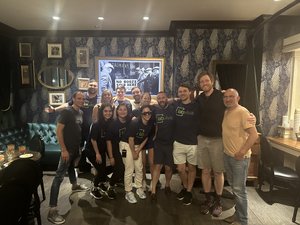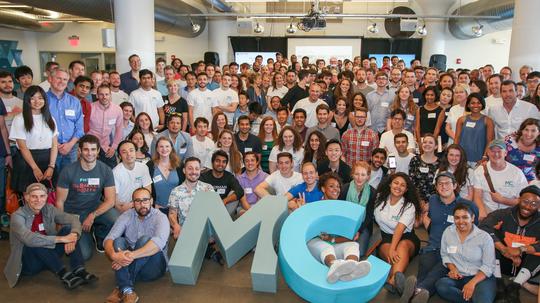
MassChallenge is now one of the largest accelerators in the Boston area. More than 100 early-stage startups were accepted into this year's program across sectors like health care and life sciences and social impact. MassChallenge is active well beyond Boston, too, with presences in several other states and internationally. In February, it tapped Siobhan Dullea to head up the accelerator as CEO after more than two years as chief operating officer, replacing MassChallenge's founder as CEO after almost a decade.
But as the startup accelerator celebrates its 10th anniversary, Dullea is most worried about one thing: complacency.
"My biggest worry is that people will rest on their laurels and say, 'Yeah, we're set,'" Dullea said. "That is not the case." Entrepreneurship rates, she notes, are actually on the decline in many cases—and she wants to fix it.
BostInno spoke with Dullea to look back at how MassChallenge has grown and what its next steps are in the ever-changing startup ecosystem.
MassChallenge is now in its 10th year with its Boston accelerator. You’ve been with it first as COO and now as CEO. What have you learned?
Before I was COO, I was actually a mentor and judge for MassChallenge for years, even as I was at my company C Space. I started working with MassChallenge then, because I wanted to get my startup mojo back and also engage with people who were doing things differently. It was really rewarding. When I joined, I wasn't surprised by the power of what MassChallenge does, but I had never seen the inner workings of it. What I was surprised by was how passionate every single employee was about what we do—around the world. That was the first thing I learned.
The second thing I learned was: It's not as easy as it looks to get the right resources to the startups when they need them. There's a lot of work that goes into figuring out how to get people engaged. We have hundreds of mentors and experts engaged, but not everyone needs everything they provide all the time. The power in the community was new to me. It looked kind of easy from the outside. When you get into it, having the relationships with all the different people in different parts of the ecosystem, to bring them in when the startups need them, is really challenging.
How do you get the right resources to the right people at the right time?
First, it's all about creating relationships right from the beginning. As you know, we're beyond Boston now. We're in nine programs in seven locations around the world. The first thing we do is talk to top leaders from all the different parts of the ecosystem, whether that’s corporate or government, or community or university. We get them engaged and make sure they're on board and their people are on board. Creating those relationships right from the start is important so that you have those relationships before your startups meet them.

I wonder if you could take me back: You said that you wanted to join MassChallenge to get your startup mojo back. I'm wondering what it was that drew you to the company and what that process was like when you first started out.
To put it in context, I was about in my 10th year at C Space, which I was part of the founding team there. After 10 years of growing the company double digits, you start to get a little insular. I felt like I was spending more time with spreadsheets than innovators. I realized I needed to look outside my company to get that startup mojo, that spark, back. I didn't know what to do. At the time, I think it must have been MassChallenge's first year, because I went down to One Marina Drive. I think [C Space board member] Diane Hessan introduced to me to them. I went to one event, and I saw that it was a little different. It was scrappy, which was fun for me. There was just so much passion. The fact that it was not-for-profit, with no equity taken from startups, was huge for me, because I wanted to give back. But I didn't want to give so that someone else could profit. I wanted to give because I wanted to get really inspired. So I started to dip my foot in a little. My first year, I did online judging. My second year, I did online judging and in-person judging. By the third year, I was all in on mentoring startups. At that point, I think I met maybe three employees of MassChallenge—it was all about the startups for me.
What do you think are some of the biggest challenges that you’ve faced in your time at MassChallenge?
I came in at a time where MassChallenge had just done some explosive growth. In 2016, they expanded to three more continents. They had the Boston program; they were doing work with Israel; they were doing work in the U.K. But then in 2016, they had just gone to full programs in Israel, Switzerland, and Mexico. The biggest challenge was catching up with that. I came from a company where I grew, from the beginning, the company globally. Here, I was trying to get my arms around: what was manageable growth, and what was growth that was a little out of control? What was already in the process of being scaled, and what needed to be contained so that we could scale it more? That was probably my first biggest challenge.
It was exciting, because I got to apply all the lessons I learned at C Space and everything I did wrong there. One of the first things I did was go around to all our programs and see what was the same and what was different, and document and collect all the things that were the same and use that as the foundation. With all the things that were different, we either decided, do we intentionally want them to be different by market—you know, is the way you engage corporations in Israel different from the way you engage them in Boston or Mexico?
How do you get your footholds in so many disparate places?
We do a lot of work before we go in. Usually, when we go into a new location, the relationships are started with the government. We go in, we talk to them, and then as I mentioned before, we talk to the leaders in all the different pieces of the ecosystem to get a feel for the challenges. When we went to Switzerland, we learned from people in the Swiss Economic Forum that even though Switzerland is not an EU country, they had more European patent applications than any EU country. They couldn't figure out what was getting in the way. After talking with them, what we all figured out collectively was that really great research was getting stuck in the university lab. People were refining these amazing technologies, but it was never translating into a product or to a market or to a business. So to go back to your question, how do you get a foothold in these locations: You go in and try to solve what the issues are. Don't just come in and say, "Hey, we want to create an accelerator." We go in and say, "Oh, that's one of the challenges. How do we set up this program to address that challenge?" That's one of the things we did in Switzerland.
It just so happens that the area we're in, making it as easy as possible for startups to launch and grow their business in the innovation ecosystem, is the solution to a lot of the challenges. That's how we position ourselves as a partner to those leaders: to create jobs, create innovation, help entrepreneurs solve challenges that are in that market or around the world.
To bring it back to the Boston area, it seems sometimes like there are a million startup accelerators around here. I think part of that is probably just because there's so much innovation going on here and so many universities to which those accelerators are often linked. So what value does MassChallenge specifically bring to the table that is different from something like MIT Solve or InnovateBU?
We are a convener. I might sound like a broken record around the innovation ecosystem, but we convene people. Because we're zero-equity, we collaborate with all these folks. We’re great partners with MIT. [Author's note: MassChallenge works with MIT in some capacities but does not work with the MIT Solve program.] The other thing is that we’re a little earlier-stage than many of the other accelerators in the Boston market or other markets. We're industry-agnostic for most of our programs, although two of our later-stage programs are specific to the industry. We also have a lot of partners that can help the startups. MIT is fantastic. They are focused on their technology and helping to accelerate those programs. They don't have the same types of deep relationships we have some of our corporate partners that really get into the weeds and mentor our startups. In Boston, I know you announced this, so you know that we have 100 startups. That's significantly larger than any of the other accelerators. That's what we add to it. We try to collaborate, versus compete, with any of these.
Don't just come in and say, "Hey, we want to create an accelerator." We go in and say, "Oh, that's one of the challenges. How do we set up this program to address that challenge?"
Switching gears a little bit: Instead of a look back, what's next for MassChallenge? What are you most excited about the next year or so?
I am excited about just about everything. We announced a big partnership: In a couple of years, we're going to be in a new location. I think that helps legitimize us in Boston and elsewhere and shows our strong foundation in Boston as our global headquarters. I just want to continue to have the impact we’ve had, expanding our support for startups and our alumni: to look for new ways to help them grow beyond our accelerator. We know we're doing a good job in our accelerators, but what can we do after that? We want to keep focusing on our community and help create more connected communities in the region. We're in Providence right now. So how do we look at all of Massachusetts and New England as a region? That's interesting to me.
Another thing that's interesting to me is the challenge of getting large companies ready to work with startups. All accelerators help startups to get enterprise-ready, so how do we work with large companies? I think that companies need to do a better job of getting startup-ready. It can take nine months for a new vendor to be onboarded to a large, really innovative organization. We’ve seen companies who are willing to work with entrepreneurs get it down to 45 days without risking any personal data issues, without risking security. We want to do that work as well. As much as we want to continue working with startups, and helping them be successful, we want to help the world be able to work with entrepreneurs and startups. That is a big challenge for entrepreneurs when they're not getting any salary. They're not getting revenue. They don't have time to wait nine months to be allowed to work with an organization. If we want these companies to get larger and more impactful sooner, we need to help companies do that.
Interesting. What advice would you have these bigger corporations, then?
Well, we have a lot of specific advice, actually. It's about internal readiness. Know what the startup's risk profile is. Don't waste a whole bunch of time talking to an interesting startup if it's not linked to what you're trying to do or if you're not ready to take some sort of risk. Make sure that you have funding—startups aren't going to work for free. If you're going to do a pilot, get the funding for that. Make sure that you have the dedicated resources internally. What companies sometimes do wrong is they get so enamored by a cool thing that an entrepreneur is doing, even if it might not be attached to their strategy; it might be the pet project of a senior person. They start to have that entrepreneur spend a lot of time shopping around in a company, and then they have no budget to help with that. Don't work with them. Don't date someone unless you're going to marry them, or unless you're open to it. Make sure you're ready to have a relationship instead just going around and wasting their time.
That internal readiness, those strategic steps, making sure that you can dedicate those resources: those are the three major things we work on. Getting from nine months to 45 days, you have to be willing to change your processes a little bit. Get down to the three questions on your security assessment that are most important. Don't find out if they have $1 million in indemnification insurance. They don't. Can you live with that? Know that before you lace the entrepreneurs down.
Absolutely. Thank you so much for this—do you have anything else that you want to add?
I’m so proud of the impact that we've had to date. My biggest worry is that people will rest on their laurels and say, "Yeah, we're set. Boston and Massachusetts is thriving. We got this covered." That is not the case. You have to stay on it. Right now, the Kauffman Foundation and other folks are seeing declining entrepreneurship rates. And that worries me. We're not at a fever pitch yet, but we have to make sure that the places MassChallenge is at, or if cities and states want to compete, they have to continue working to make sure it's a welcoming place for entrepreneurs, figuring out where the friction and barriers and keep working at it. My biggest fear is for people to say, "Yeah, we got this. Let's look at something else." The only way we're going to be able to continue to create jobs, create more funding, and attract talent is to continue to focus on making sure that for entrepreneurs, it’s as easy as possible to launch and then grow their businesses.
This conversation has been lightly edited for length and clarity.
